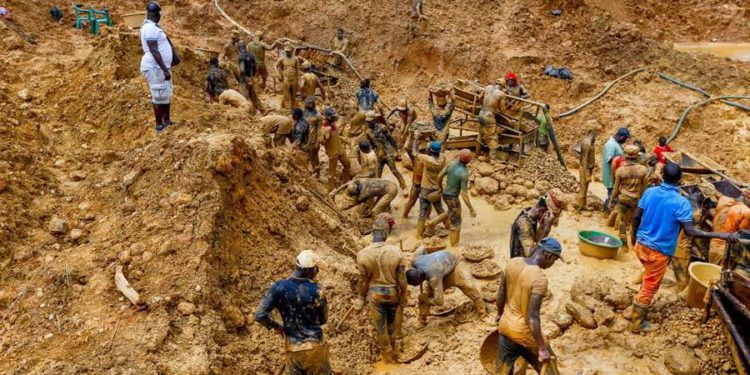NDC and Movement for Change Reaffirm Opposition to Illegal Mining at CSO Alliance Post-Manifesto Engagement
Illegal mining, commonly known as galamsey, has had a devastating impact on Ghana’s environment and economy. Despite repeated government crackdowns, the practice remains widespread, contributing to significant environmental degradation and posing a major threat to the country’s natural resources.
At a recent post-manifesto engagement organized by the CSO Alliance, representatives of the opposition National Democratic Congress (NDC) and the Movement for Change declared their firm opposition to the practice. Both groups pledged to intensify efforts to tackle galamsey, which has become synonymous with illegal mining in Ghana. The ruling New Patriotic Party (NPP) was notably absent from the event, highlighting ongoing political complexities surrounding the issue.
Galamsey’s most visible environmental impact is the widespread pollution of water bodies. Rivers such as the Ankobra, Pra, and Birim, vital water sources for millions, have become heavily contaminated with mercury and cyanide, chemicals used by illegal miners to extract gold. These pollutants not only harm aquatic ecosystems but also seep into drinking water supplies, endangering public health and agriculture in affected regions. The destruction of these water bodies has become emblematic of the environmental havoc wreaked by galamsey operations.
Beyond water contamination, galamsey has also contributed to deforestation and land degradation. Large tracts of forest are cleared to access mineral deposits, stripping the land of vegetation and leaving behind barren, unproductive landscapes. The ecological balance in mining areas has been significantly disrupted, with many species losing their natural habitats. Moreover, the loss of forest cover exacerbates the effects of climate change, including rising temperatures and unpredictable rainfall patterns, further compounding the challenges faced by rural communities.
Meanwhile, according to Professor Kwesi Anning, Director of the Faculty of Academic Affairs and Research at the Kofi Annan International Peacekeeping Training Centre, Ghana risks becoming a “GalamState,” where illegal mining becomes institutionalized, and key state functions are captured by corrupt networks linked to galamsey.
He describes the term as reflecting a state where political and criminal networks collaborate to undermine the rule of law. Professor Anning warns that Ghana’s legislature, executive, judiciary, and regulatory agencies are increasingly compromised by entrenched corruption tied to the illegal mining industry.
Ghana is a major global gold producer, with artisanal and small-scale mining (ASGM) accounting for an estimated 30% to 40% of the country’s annual gold production. While ASGM provides critical livelihoods for many rural communities, it is also a significant driver of illegal mining activity. The economic toll of galamsey is immense.
According to industry estimates, Ghana loses approximately $2.3 billion annually due to gold smuggling, as up to 3 tonnes of gold produced by small-scale miners are trafficked out of the country each month, bypassing official channels. This smuggling deprives the government of vital revenue and fuels an underground economy.
Across sub-Saharan Africa, ASGM engages millions of people, making it one of the most significant non-agricultural livelihood activities in the region. However, much of this sector operates outside formal regulatory frameworks, with only a fraction of ASGM gold entering the legal market. Globally, while ASGM accounts for 20% of total gold production, only 3% of gold refined by accredited refineries comes from artisanal sources, reflecting the disconnect between the formal and informal mining sectors.
Efforts to curb galamsey have so far struggled to achieve lasting success, with entrenched political interests and organised crime complicating enforcement efforts. Nonetheless, the declarations by the NDC and Movement for Change signal renewed political will to address the issue, but as to whether these commitments will translate into effective action remains to be seen.









